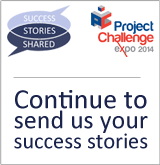
At a UK bank, customer’s complaints were rising and the number of people in arrears on payments was spiralling out of control. The problems had reached board level in the bank and a solution just had to be found.
What was going wrong? From all accounts the bank processes and policies were being executed effectively – but they just were not having the right effect.
With tight timescales and the need to make rapid changes it was decided to appoint a project team. Bakr was to advice the team from a knowledge management perspective and to provide support and guidance to the new project manager who was business knowledgeable but relatively inexperienced in projects.
The project would start with an investigative stage to surface the root causes of the problems. The change director, who was also accountable as the business sponsor, was keen to select the best front-line staff to be part of this team. But Bakr was not convinced – these people were the ones using and supportive of the current processes – the processes which were already shown not to be working. Instead he put forward the case for picking a ‘maverick’ team – the staff who had been complaining about the approaches – the ones who were always saying there was a better way.
 At first the management team were sceptical – after all these staff were the difficult ones – the ones who were not performing under the current approaches. Bakr was persuasive and got his team of eight mavericks who were interviewed and selected as staff who doggedly questioned the way things were done.
At first the management team were sceptical – after all these staff were the difficult ones – the ones who were not performing under the current approaches. Bakr was persuasive and got his team of eight mavericks who were interviewed and selected as staff who doggedly questioned the way things were done.
This kind of team is not the easiest to manage and careful consideration was put into structuring the environment and the team engagement. For the investigation to be effective these people were encouraged to try things out which were out of the norm, and sometimes even counter to standard policy. That meant they had to be empowered to take the action necessary and that the management team round them would support them through this process.
The team were co-located in one bank site and the top most difficult clients cases were selected for their attention. For a period of 3 weeks – each day the team dealt with 50-60 cases – working on the phones from 8am to 3 each day. At 3pm the reflection and analysis began. In a room full of flip charts Bakr and the project manager facilitated the gathering of the stories from the day. What was going wrong – what practices seemed to work, what could they try doing to sort out the problem? The team were encouraged to think out of the box and to put themselves into the customers’ shoes – “if it were you – what would be good for you?”.
As an example, in one story the manager related how a client was extremely upset by the attitude of different staff who contacted him. He was paying for repayments on a loan for his son’s bike and was capable of paying but had been so irritated by the banks approach and conflicting messages, he resorted to withholding payments. The team decided to assign a single liaison officer (from this experimental team) and no other person was allowed to communicate with the customer. Within a short time the problem was turned around and payments started coming in.
Within one month the success achieved by the team was phenomenal on these most difficult of client cases. From a starting point of just 22% to a massive 94% of payments being paid and back on a defined payment schedule.
This investigative approach transformed a group of mavericks into a team who were passionate and empowered to take forward and replicate the lessons learned in other operational areas. It was this energy and new found belief in the individuals in the team which allowed them to make the tricky task of operationalisation – taking the new processes back into operation – possible.
In reflecting back on this rewarding project, Bakr identified three major learning points:
- Before initiating a project, it is critical to recognise sources of complexity and to prepare the team (including sponsor) that such complexity often requires innovative, experiential approaches for problem-solving; rather than over-depending – often unsatisfactorily – on standard project management approaches
- In selecting the project team, it is important to understand that suitable change agents are not necessarily the best performing staff; they are more likely to be the most eager for change (the mavericks)
- The planning and delivery stages in complex projects sometimes require iterative cycles of action learning, as project deliverables are unclear at the time of initiation.
What do you think?
My thanks to Bakr Zade for sharing this story.
For further information on the Success Stories Shared initiative click here.
If you would like to share your success story you can email info@citi.co.uk
For further stories you can also visit http://www.pi3.co.za/success-stories-shared and http://www.virtualprojectconsulting.com/success-stories-shared/









